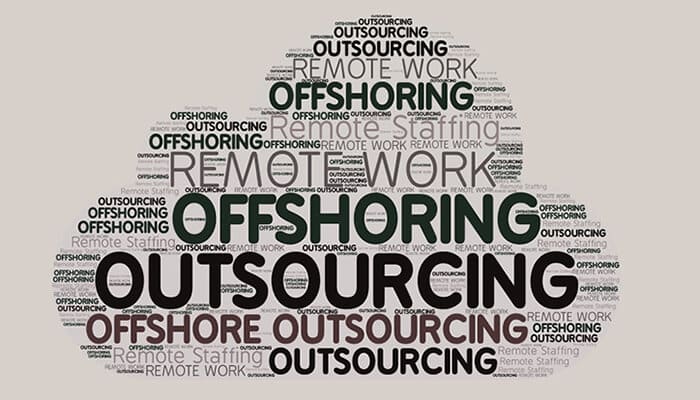Confused about whether Outsourcing, Offshoring and Offshore Outsourcing are interchangeable terms? Whilst these terms are used frequently interchangeably, technically they are all different processes. Here is a quick guide of sorts that helps you understand the difference between each of them for better decision-making.
Outsourcing
The term ‘outsourcing’ simply refers to contracting an outside agency or service provider for carrying out those office tasks and functions for which you either lack in-house expertise or the time and resources. The outsourcing vendor can be in the same city or even country of residence.
Typically, the decision to outsource stems from a desire for efficiency and cost-saving for the company.
In today’s global scenario, almost every organization outsources in some way. Typically, the function being outsourced is considered non-core to the business. For example, an electronics goods company might decide to outsource its customer care operations to those firms that specialize in such types of work. Many large companies now outsource jobs such as call centre services, e-mail services, and payroll.
Offshoring
Offshoring specifically implies physically shifting a portion of the business processes to a different country altogether. However, the work itself may or may not be outsourced. There’s a difference. What this means is that the company that offshores usually ‘sets up shop’ in that foreign country, right from securing the place and infrastructure to hiring people or even shipping some of its own local staff to oversee the operations in the new country. The new setup becomes the ‘offshore office’ of the parent company located in its land of origin. Offshoring is essentially, simply opening a second (or another office) for your organization but now overseas.
The biggest motivating factors to have one’s work offshored are to attract a wider talent pool, reduce labour expenses, avoid the inevitable government red tape, taxes and employee laws and regulations.
Multinational corporations like IBM, Dell, GE, etc have all set up their offshore units in low-cost destinations around the world, especially India.
Offshore Outsourcing
As the name suggests, offshore outsourcing combines both, outsourcing and offshoring. This is another form of outsourcing, but now where the outsourced business functions are specifically performed in another country. While big multinationals like Dell or IBM actually set up an offshore office in a new country, the logistics behind such move mean not many SMEs can offshore. As a result SMEs typically offshore and outsource in an attempt to gain a cost saving.
However, there’s a catch. Where many SMEs often go wrong is when they offshore outsource their core, daily, ongoing tasks. Tasks which require their control and management. That’s when things can start going downhill as offshore outsourcing is best suited for the non-core functions of one’s business.
But now even SME clients can offshore like the MNCs with VirtualEmployee.com and retain control. VirtualEmployee is a relatively new service in the offshoring industry that enables SMEs to open branch offices and or hire their own in-house dedicated employees just like the MNCs. Technically, it is offshore outsourcing because, legally, you don’t employ the virtual employees you hire, but practically speaking, it is offshoring just like MNCs because you get assigned your own dedicated resource as well as a readymade office in India.
Similarities between Outsourcing and Offshore Outsourcing
- Both outsourcing and offshore outsourcing involve a third party to handle their non-core business processes.
- In both cases, the primary motivating factors are low labour cost, a technologically bright work force, and increased profits.
Differences between Outsourcing and Offshoring
- Location: Outsourcing may or may not be outside the country of residence but offshoring always involves a foreign country for performing the outsourced functions. A company can outsource any of its non-core business processes like payroll, customer service and similar functions, to a third party service provider who may work within the same country or outside, if they so prefer. However, offshoring specifically refers to taking the function out of the country of residence to one where costs are less prohibitive. The offshored task may be performed by the employee of the company itself or may be outsourced to an outsourcing service provider in that foreign country.
- The biggest difference is that while outsourcing can be (and often is) offshored, offshoring may not always involved outsourcing.To simplify, a large corporation may decide to set up a separate offshore operations in a foreign country but may not necessarily outsource its operations to a third party provider. It may just physically set up an extension of its head office in a new country, spurred on mainly by the latter’s low-cost and high-profit possibilities.
India is the outsourcing and offshoring giant in today’s world
India has emerged as the dominant player in the offshore outsourcing landscape, and western companies have been outsourcing everything from software development and animation to engineering and digital marketing to India. In the second part of our continuing series, read about the respective advantages of outsourcing, offshoring and offshore outsourcing.







